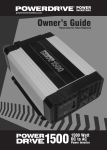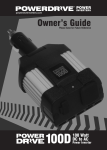Download Power Drive 300 User's Manual
Transcript
powerdriveinverters.com Owner’s Guide Please Save for Future Reference 300 300 Watt DC to AC Power Inverter Thank you for purchasing the POWERDRIVE300 power inverter, a high performance solution to using household power while on the road. Please read and understand all of the information provided in this manual before operating or installing. If properly used, the inverter will give you years of reliable service providing AC power for TVs, computers and stereos. For safe and optimum performance, the inverter must be installed and used properly. Carefully read and follow the guidelines in this manual giving special attention to the CAUTION and WARNING statements. Keep this manual for reference should troubleshooting be necessary. CAUTION statements provide information that could damage your inverter or equipment connected to it. WARNING statements provide information on conditions that could result in personal injury or loss of life. WARNING: Incorrect installation or misuse of the RPPD300 could result in personal injury or damage to the inverter and/or attached equipment. Read and follow the directions in the owner’s manual. The ROADPRO RPPD300 produces the same potentially lethal AC power as normal household outlets. It is suggested that you treat it with the same respect that you would any AC outlet. WARNING: SHOCK HAZARD, KEEP AWAY FROM CHILDREN. DO NOT insert any foreign objects into the RPPD300’s outlets, vents or fan openings. DO NOT expose the RPPD300 to rain, water or any other liquids. DO NOT connect the RPPD300 to utility power distribution systems or branch circuits. WARNING: HEATED CASE AND SURFACE. The case to the RPPD300 may become very warm under high power operation reaching 140°F. Be sure that there is at least 4 inches of unobstructed air space around the entire surface of the inverter at all times. During use, DO NOT place materials that could be damaged by heat on or near the RPPD300. WARNING: EXPLOSION HAZARD. DO NOT operate the RPPD300 near flammable fumes or gases such as the bilge of a gasoline power boat or near propane tanks. DO NOT operate the RPPD300 in an enclosed area that contains automotive type lead-acid batteries. This type of battery emits explosive hydrogen gas which can be ignited by sparks. CAUTION: DO NOT connect the RPPD300 to live AC power circuits. Damage to the inverter will result even if the power switch is in the OFF position. DO NOT connect any AC device which has its neutral conductor connected to ground. DO NOT expose the RPPD300 to air temperatures in excess of 104°F. DO NOT use the RPPD300 on the following items: 1. Small battery-operated appliances such as flashlights, razors and nightlights that can be plugged directly into an AC outlet to recharge. 2. Certain battery chargers for battery packs used in hand power tools. These chargers will have a “Warning Label” indicating that dangerous voltages are present at the battery terminals. RPPD300 Waveform Output: The output waveform of your RPPD300 is referred to as “square wave” or “modified sine wave.” Some very sensitive electronic equipment and some medical equipment (listed below) may not operate satisfactorily on “square wave” or “modified sine wave.” It is a stepped waveform designed to have characteristics similar to the pure sine wave shape of utility power. A waveform of this nature is suitable for most AC loads (including linear and switching power suppliers used in electronic equipment, transformers and motors). The problems described above, do not occur with most battery-operated equipment. The vast majority of these items use a separate charger or transformer that plugs into the AC outlet and produces a low voltage output. If the label on your adapter states that it produces a low voltage (AC or DC) output (30 volts or less) then the RPPD300 will operate the item safely. Some of the following items may not operate properly on a “square wave” inverter. If you have any questions, contact the device’s manufacturer. • Laser printers, photocopiers, magneto-optical hard drives. • Certain laptop computers. • Some fluorescent lights with electronic ballasts. • Power tools employing “solid state” power or variable speed control. • Some battery chargers for cordless tools. • Digital clocks with radios. • Medical equipment such as oxygen concentrators, nebulizers, and CPAP machines. INSTALLATION: Selecting a suitable location The RPPD300 must be installed in an area that meets the following requirements in order to operate safely and provide optimum performance: 1. DRY: DO NOT expose the unit to moisture. 2. COOL: Ambient air temperature should be between 32°F and 104°F. Cooler areas are best. 3. VENTILATION: Allow at least 4 inches of clearance above and around all sides and top of the unit for proper cooling. 4. SAFE: DO NOT install the RPPD300 in a compartment with batteries or flammable liquids or vapors such as gasoline or propane. 5. CLEAN: DO NOT install the RPPD300 in an area that is prone to dirt, dust or debris. This is especially important if used in a work environment. Your new RPPD300 inverter has been supplied with two sets of power cables. 1. Battery clip cables: this will allow you to use the inverter at the rated 300 watts. 2. Power port plug: this cable is for smaller loads, up to 150 watts maximum. (Check your owner’s manual for your vehicles power port amperage rating) Connect the Power Cables to the Inverter: 1. Press the Power Button on the inverter to the off position. 2. Connect cable to the Power Input Terminals on input end of the inverter. The red terminal is positive (+) and the black terminal is negative (-). Unscrew the terminal on the inverter and install the appropriate color (black to black & red to red) ring-terminal of the cables and tighten the screws to clamp the wires securely. NOTE: It is a good idea to check and tighten these screws from time to time. They can become loose by vibrations or thermal cycling. Loose connectors result in excessive voltage drop and may cause overheated wires and melted insulation. Connect the Power Cables to the Battery: 1. Connect the cable from the Negative Terminal (Black) of inverter to the Negative Terminal of the battery. 2. Connect the cable from the Positive Terminal (Red) of the inverter to the Positive Terminal of the battery. You might observe a spark when you make this connection since current can flow to charge capacitors in the inverter. CAUTION: Reversing the polarity of these cables (positive to negative) will result in damage to the RPPD300 and will void the warranty. 3. The inverter is now ready to deliver AC power to your loads. Press the Power Button to on. If several loads are to be operated by the inverter, turn them on separately, after the inverter has been turned on. This will ensure that the inverter does not have to deliver the starting currents required for all the loads at once. To Operate Inverter from Power Port: Connect red and black ring terminals as described above and insert plug into power port. Make sure the power port socket is clean and provides a tight fit for the plug. NOTE: The Power Button turns the control circuit in the inverter on and off. It does not disconnect power from the inverter. When the button is in the off position, the inverter draws no current from the battery. When it’s in the on position, but no power is being supplied to a load, the inverter draws less than ½ amp from the battery. This is low current draw. It would take more than a week to discharge a 100 ampere hour battery at this rate depending on the age of the battery. For safety disconnect the RPPD300 from the battery when not in use. Operating Indicators: Red and green LED Indicators on top of your inverter will show the status of the inverter and alert you to conditions that could cause the inverter to shut down. Current Overload Protection: If the inverter is overloaded, it will shut down to protect itself. The red LED will illuminate to indicate Overload Protect. To restore normal operation, disconnect the excessive load and turn the unit Off and On again using the Power Button. CAUTION: Although the inverter has protection against over-voltage, it may still be damaged if the input voltage were to exceed 16 volts. Low Voltage Protection: If the DC input voltage drops below 11 volts, the red LED will light up to indicate Low Voltage Protection, but the unit will continue to operate. If the input voltage drops to 10.5V or less, the inverter will shut down to protect the battery, the red LED will be lit and the alarm will continue. To restore normal operation, return the DC input voltage to at least 12V. The inverter will automatically return to normal operation. High Voltage Protection: If the DC input voltage rises above 15 volts, the inverter will shut down to protect itself, the red LED will light up to indicate a high voltage protection. To restore normal operation, return the DC input voltage to less than 15 volts. The inverter will automatically return to normal operation. Over Temperature Protection: If the internal inverter temperature rises above the alarm threshold, the unit will continue to operate. If the internal temperature rises to 104ºF, the inverter will shut down to protect itself. NOTE: Internal inverter temperature can rise due to being operated in a high heat environment or due to the fan or vents being blocked during operation (even in relatively cool outside air). To restore normal operation, turn the unit off and allow it to cool. The inverter will automatically return to normal operation after it has cooled. USB Outlet: The USB outlet will supply 5 volts at 500ma to charge and power cell phones, iPods® and other small electronics. Operating Limits Power Output: The inverter can deliver 300 watts for about 60 minutes. The inverter must cool for 15 minutes before it can resume operation at 300 watts. NOTE: Operating time will vary depending upon the type, capacity charge level of the battery, and the power draw of the AC products you are using. With a normal vehicle battery and a 100 watt load (such as a small television) you can expect an operating time of 2 to 3 hours. It is recommended that you start your vehicle once an hour when using the RPPD300 for extended periods of time to prevent draining the battery. WARNING: To prevent personal injury or loss of life, never start or leave your engine running in a poorly ventilated area such as a garage. Helpful Formulas: To Convert AMPS to WATTS: AMPS X VOLTS = WATTS To Convert WATTS to AMPS: WATTS ÷ VOLTS = AMPS These formulas yield a close approximation of the continuous loads of a product. To calculate approximate Startup Load: Multiply: WATTS X 2 = Starting Load This formula yields a close approximation of the starting load of the appliance, although some may require an even greater starting load. NOTE: Induction motors such as air conditioners, refrigerators, freezers and pumps may have a start up surge of 3 to 7 times the continuous rating. Most often the start up load of the appliance or power tool determines whether an inverter has the capability to power it. For example: You have a freezer with a continuous load of 4 amps, and a start up load of 12 amps: 4 amps x 120 volts = 480 watts continuous, 12 amps x 120 volts = 1440 watts starting load You would need an inverter with peak-surge rating greater than 1440 watts to run this appliance. FORMULA to convert AC Watts to DC Amps: AC Watts divided by 12 x 1.1 = DC Amps This is the size vehicle alternator you would need to keep up with a specific load; for example, to keep up with a continuous draw of 1000 watts, you would need a 91 amp alternator. To calculate the total watt-hours of energy consumption: Multiply the power by the operating time. To determine how many 12-volt amp hours will be consumed, divide the watt hours by 10. Example: 150 Watts x 1 Hour = 150 Watt Hours 150 Watt Hours ÷ 10 = 15 12 Volt Amp Hours Estimated Watts Used by Common Appliances and Tools Appliance 12" 3 speed fan VCR CD or DVD player SONY PS3 Xbox Console LCD television Laptop computer Approx. Watts 230 40-60 35 360 100 50 » 150 150 Specifications: Operating AC Voltage (Normal) . . . . . . . . . . . . . . . . . . . . . . 105~125-Volts AC DC Input Voltage . . . . . . . . . . . . . . . . . . . . . . . . . . . . . . . . . . . . 10~15-Volts DC Continuous AC Power Output . . . . . . . . . . . . . . . . . . . . . . . . . . 300/150 Watts USB Output . . . . . . . . . . . . . . . . . . . . . . . . . . . . . . . . . . . . . . . . . . . . 5 Volts DC Maximum AC Power Output (Surge) . . . . . . . . . . . . . . . . . . . . . 600/150 Watts AC Output Frequency . . . . . . . . . . . . . . . . . . . . . . . . . . . . . . . . . . 60Hz ±2Hz AC Output Waveform . . . . . . . . . . . . . . . . . . . . . . . . . . . . Modified Sine Wave Battery Drain with No AC Load . . . . . . . . . . . . . . . . . . . . . . . . . . . . . 0.50 Amps Efficiency (Maximum). . . . . . . . . . . . . . . . . . . . . . . . . . . . . . . . . . . . . . . . . . 87% Ambient Operating Temperature Range. . . . . . . . 14°F (-10°C) ~ 104°F (40°C) Low Battery Shut Down Point . . . . . . . . . . . . . . . . . . . . . . 10.5 ±0.3-Volts DC High Voltage Shut Down Point . . . . . . . . . . . . . . . . . . . . . . 15.5 ±0.5-Volts DC Specifications Subject to Change without Notice No output voltage Red LED illuminated No output voltage Red LED illuminated Alarm sounding Low output voltage Problem/Symptom Inverter switched off No power to inverter Reverse DC polarity Short circuit High input voltage Overloaded Low input Voltage Overloaded Possible Causes Check connections. Make sure battery is fully charged. Turn inverter on Check wiring to inverter. Observe correct polarity (black to black/red to red). Inspect cables from battery. Check load for proper operation. Inspect cables from battery. Make sure the inverter is connected to a 12V battery. Check regulation of charging systems Allow inverter to cool off. Reduce load. Improve ventilation; make sure ventilation openings in the inverter are not obstructed. Reduce ambient temperature. Recharge battery. Check connections and cable. Continuous operation input current required. Reduce the load. Solution No output voltage Thermal shutdown No output voltage Red LED illuminated Poor DC wiring Poor battery condition Low battery alarm on all the time This Limited One Year Warranty from POWERDRIVE, a DAS brand, applies to all electronic products and devices manufactured by DAS Distributors and sold under the brand name POWERDRIVE. Terms of the Warranty: POWERDRIVE warrants that the product you have purchased from a DAS authorized retailer is free from defects in materials and workmanship under normal use during the warranty period. The warranty period begins on the day of retail sale. This warranty extends only to the original purchaser. It is not transferable to anyone who subsequently receives the product. It excludes all expendable parts (fuses, etc). During the warranty period POWERDRIVE will repair your defective product, replace it with an identical item, or at our option exchange it for an equivalent product of value and performance. This Limited Warranty does not extend to any product that has been damaged or rendered defective as a result of: an accident, misuse or abuse, as a result of an act of God, by operation outside the usage parameters stated in this manual, by modification of the product, attempted repair, or as a result of war or terrorist attack. Other limitations of this warranty exclude; payment for your lost time, loss of use of your product, or property damage caused by the product or its failure to work, or any other incidental or consequential damages including personal injury. Except as expressly set forth in this warranty statement, POWERDRIVE makes no other warranties expressed or implied. Defective products must be returned to the dealer within 30 days, after 30 days, the product may be returned to POWERDRIVE. When returning products to POWERDRIVE: Shipping to POWERDRIVE shall be prepaid, your replacement will be mailed back to you at no additional charge. Carefully pack product and all included accessories into a suitable box, along with original dated register receipt or invoice, a letter stating the defect, daytime phone number, and a physical return address. (UPS will not deliver to a PO Box.) • Any package with a PO Box address will not be processed, and will be held until further notification from you. • Make sure you can track your shipment to us. POWERDRIVE will not be responsible for lost packages. • POWERDRIVE will not be responsible for damage incurred during shipment to us. • Failure to provide a dated proof of purchase will invalidate warranty. Ship to: POWERDRIVE Returns 1875 Zeager Road, Elizabethtown, PA 17022 For customer assistance and technical support call 1-866-622-7979 Monday through Friday 8:00am to 5:00pm Eastern Time. Or write to: [email protected] 1875 Zeager Road, Elizabethtown, PA 17022 © POWERDRIVE
























